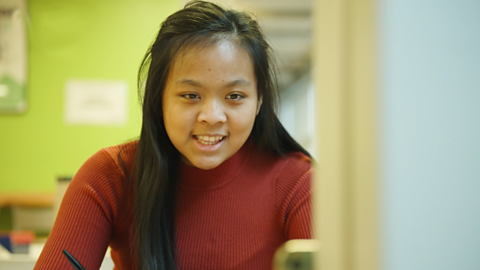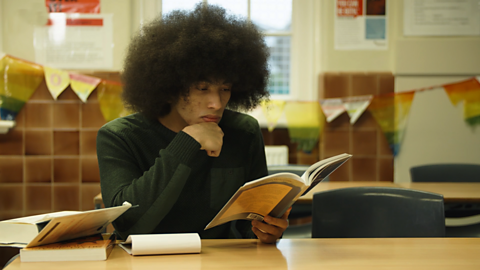This article was last updated on 4 May 2023.
It's okay to get stressed and feel like your head is about to explode during GCSE or Nationals exam season, especially when you have so much to remember and all your exams ahead of you. Don't worry – we've got you.
Take a breath, step back from your revision for a few minutes and watch our short video containing advice from our Mind Set exam veterans. You never know, there might be a small tip or piece of advice that you take on board that will make the difference in one of your exams.
Video: Exams and assessments
Milly Treat assessments during school time like the real thing, because it will help you get rid of that stress when it comes to the real exam.
Milly: I definitely use past papers in my revision. Check with your teachers what topics you should be covering, because this does change from year to year.
Joe I think past papers are the best thing to get you ready for GCSEs, because it gets you familiar with the questions, the style of it, and I'd even put the same time conditions.
Baxter I had a traffic light system for marking my past papers, and it really helped me understand, if it was red, I didn't know at all, amber, I sort of knew it and then green, I knew it. So it just really helped me for revision. My school was very helpful. I had dyslexia, so luckily they gave me extra time when I was doing my exams and it just really helped, because made me not stress about the time and I could just focus on the paper.
Nung My school was really supportive. They were able to adapt to my needs and help me and support me. So the support was second to none. But I was able to get the right support by having a smaller room so I can cope under pressure. The thing is, the key message to you guys is like, never be afraid to ask for help.
Shay I feel like my teachers helped me a lot before preparing for my exams and assessments, and it was definitely a big help going into the exam knowing that I had their support.
Lauren The only time I've had breakfast is when I was doing my exams, because it was just brain food, and I had cereals or porridge or whatever.
Shay I always found it really useful to pack my bags the night before an exam, because it's just one less thing to worry about and stress about in the morning.
Joe One thing I did like massively, and I think a lot more people should start doing it, the final half hour until your exam, close your revision books, take a step away from your friends, take some deep breaths in, you're now fully ready for that exam, and you're going to be in a better state than you are if you're messing about your friends five minutes before an exam
Milly Takes some water with you into an exam. Exams tend to be in summer, so that will be there to keep you hydrated and keep you calm and cool you down.
Jacintha Keep focussed on your own desk and your own paper. Don't get distracted by what other people are doing
Iain Well in the exam hall, I found the best thing to do was calculate how long you had with each mark. Just with a simple like you have 30 marks in one hour, so you can give yourself two minutes a mark. So that way you're not spending all your time on one question. You should use every second you have in an exam.
Milly When I'm in an exam, I like to read through the questions twice, because it helps me to answer the questions to my full ability. I like to highlight the command words within a question, such as describe or explain.
Sekani Time management is very important when you're in an exam, because some of the more difficult questions with more marks are at the back of the paper. So definitely spread out your time evenly.
Rohan At the start of exam, I read the paper just so I know what I'm expecting towards the end. If I finish early, I always like to look back through the exam at least once or twice, just to make sure I haven't missed out anything or check through my answers once again. There might be something that you've missed that will earn you an extra mark.
Milly When I finish early in an exam, I like to read through what I've already answered, especially on them longer questions, because you do get stressed and you do panic a little bit, but by reading through at the end of an exam, when you do have extra time, you can identify any mistakes you have made and correct them while you can.
Daniel An exam day there's a huge mental side to it. Going into the exam room with clear thoughts and confidence can boost your performance.
Our coaches’ top tips for your exams and assessments

Milly treats assessments during school time as if they're the real thing. She says this helps get rid of the stress when it comes to your real exam. She recommends using past papers in your revision and checking with your teachers what topics you should be covering. Similarly, Joe says that past papers are the best thing to get you ready for GCSEs as they help familiarise you with the questions, style of exam and time conditions you will face in the real thing.
Past papers are such an important part of your exam prep that we've got a whole guide on them! Check out our 5 essentials for past papers here
Being prepared in advance can help you feel less nervous for your exams, Shay found it really helpful to pack his bag the night before an exam. This was one less thing for him to stress about in the morning. Daniel says, "going into the exam room with clear thoughts and confidence can boost your performance." If you're feeling stressed, we've got you with these stress-relieving tips for the run-up to exams.
If you are worried about your exams, and have additional needs, make sure you speak to a teacher. Nung’s school were really supportive – they were able to adapt to her needs and help her by allowing her to use a smaller room rather than the exam hall. She says you should never be afraid to ask for help. Baxter has dyslexia and his school was really helpful – they gave him extra time for his exams, which really helped him as it made him less stressed and more able to focus on the exam paper.
If you struggle with time management, Iain suggests to calculate how long you have with each question in the exam based on how many marks each question awarded. This helped him to not spend too long on one question. He says that you should use every second you have in an exam. Sekani says that some of the more difficult questions with higher marks are at the back of the paper, so it’s important to spread your time out evenly. Rohan's top tip is to check back through your paper, "If I finish early, I always like to look back through the exam at least once or twice to make sure that I haven’t missed out anything and to check through my answers. There might be something that you’ve missed that will earn you an extra mark."
Have a gander at this guide for some more useful do's and don'ts in your exams.

Top tips from Ellie Simmonds
Team GB Paralympian Ellie Simmonds knows a thing or two about preparing for big events. Here, she shares her advice on how to stay calm.
Ellie Simmonds Hello. I'm Ellie Simmonds, a British Paralympic swimmer. For me, when I was leading up to a big pressured event like the Paralympics, for me one of the big things that I would do is talk. I would always have that person that I could talk to leading up to it. It just helped to release that pressure off and being able to express the feelings that I would feel.
And also for me one of the big things is using the things like mindfulness; doing a bit of meditation every single day. I used to do it for about ten minutes, especially leading into Tokyo 2021, which was quite a stressful Paralympics with covid and all those implications and having that ten minutes out where I'd be able to not think about anything and be totally grounded.
And also the likes of yoga, in the past couple of years using the things like that has really helped me be clear on my mind and using things like friends. For me, with my best friend Gemma, we used to, leading up to the Tokyo Games, we would have to say the three things that we were grateful for. Because I think sometimes being consistent and knowing what you're thankful for takes away the stress of the other factors of life.
Top tips from Dean McCullough
And here's Radio One DJ Dean McCullough on how you can use music to get you in the right frame of mind on exam day.
Dean McCullough Hello. It's Dean here from Radio 1. And if I was putting together a playlist to get me ready for an exam or an interview or something really important, I would make sure that it's got three main ingredients: artists that you love. If you're a massive Ed Sheeran fan, Little Mix fan, Kim Petras, Rina Sawayama, stick them in there. Those feel good artists that you go to if you're going through a break up or your mum and dad have really got on your nerves, get those in there. Songs that make you feel good.
And let's put songs in there that you know all the words to. I'm talking those big anthems. Those big Beyoncé tracks. Those Blossoms, Coldplay, just tunes that everybody knows, that you can sing along to and distract you from what's coming ahead. And thirdly, music with a beat. I'm talking dance tunes. David Guetta, Eric Prydz, Prospa, those songs that when you hear them you're transported into that music video and you feel like you're the star of the show.
Get those in your ears on your headphones and put some bass in that walk and get yourself down there and absolutely smash it. And if you've got enough on your plate and you want someone else to do that for you, head on to the BBC Sounds app and find Radio One dance. It's my number one place to go to if I need to feel good. I can escape to these big banging tunes to make me feel good, to make you feel uplifted and you've got some of the biggest names on the planet on there putting mixes together for exactly what you're looking for. If you're working out, getting ready for an exam or if you just need something to pick you up. Go on there and check it out.
What is The Mind Set?
The Mind Set is two things: a series of films to help support you through your GCSEs and Nationals and a group of amazing young coaches who appear in the films.
Our coaches have been through their GCSEs or National Qualifications already. They come from all different backgrounds and all corners of the UK and they’ve all faced different challenges in getting to grips with exam revision. What they’ve got in common is that they all have heaps of exam revision tips, advice, helpful hints, hacks and wonderful words of wisdom they want to share with you.
In the series, we also hear advice from mental health professionals like Josh Fletcher (AKA “Anxiety Josh”) on how to look after your wellbeing and stay resilient during revision and exams season and we have top revision hacks from our very own memory expert, Dr Vanessa Loaiza!
Explore the Bitesize Study Support pages for more information and revision support.
This article was last updated on 12 October 2023.
If you need support
You should always tell someone about the things you’re worried about. You can tell a friend, parent, guardian, teacher or another trusted adult. If you're struggling with your mental health, going to your GP can be a good place to start to find help. Your GP can let you know what support is available to you, suggest different types of treatment and offer regular check-ups to see how you’re doing.
If you’re in need of in-the-moment support you can contact Childline, where you can speak to a counsellor. Their lines are open 24 hours a day, 7 days a week.
There are more links to helpful organisations on BBC Action Line.
More like this
Revision and exams: How to be resilient
Advice on how to handle setbacks during revision and exams season.

Study-life balance
Guidance on how to find the right balance between work and play to reduce stress.

Revision: How to keep calm
Advice on how to stay calm whilst revising.
